You are on CGS' Legacy Site.
Thank you for visiting CGS! You are currently using CGS' legacy site, which is no longer supported. For up-to-date information, including publications purchasing and meeting information, please visit cgsnet.org.
Landing Page
Hironao Okahana, Associate Vice President, Research & Policy Analysis
A number of recent studies have drawn attention to the mental health challenges experienced by graduate students.[1] Studies note that the prevalence of mental health challenges among PhD students is higher than that of the highly-educated general population, and much higher than in the general population.[2] The most recent study published in Nature Biotechnology reported that 39% of their participants, mostly doctoral candidates, fell into the moderate-to-severe depression range,[3] while other studies reported that one in two PhD students has experienced psychological distress, and one in three is at risk of a common psychiatric disorder.[4] Some factors known to adversely affect the mental wellness of graduate students have also been noted in CGS’s recently concluded “Doctoral Initiative on Minority Attrition and Completion (National Science Foundation grant number 1138814)” project. In that study, we found that underrepresented minority doctoral candidates in science, technology, engineering, and mathematics fields were more likely to feel isolated from other students and worried about their mental or physical health than their peers[5].
The challenges surrounding mental wellness of master’s and doctoral students are at the forefront of the minds of many graduate deans in the CGS community. In the 2018 CGS Pressing Issues Survey[6], 63% of respondents strongly agreed or agreed that current graduate students struggle to maintain mental wellness more than students five years ago. Only 10% of respondents disagreed with the statement and none strongly disagreed. However, even with this heightened awareness about mental health challenges among graduate students, graduate deans also seem concerned that campus stakeholders may not currently be equipped to address these challenges.
Identifying Mental Health Challenges
When asked how well their institutions inform and train various campus stakeholders to recognize symptoms of mental health challenges in graduate students and in turn refer those students to appropriate support services, many graduate deans who responded expressed concern that their institutions weren’t doing enough. Notably, the results suggest that more than four out of ten graduate deans think that more can be done to inform and train graduate faculty members, faculty advisers, PIs, and dissertation/thesis chairs, as well as graduate program directors/department chairs and graduate students themselves. Only 21% of deans reported that their institutions do an excellent or good job of informing and training graduate faculty members. About one out of ten respondents (11%) reported that they do not know if graduate students are informed or trained about symptoms of mental health issues.
However, we also learned that support services for mental health are available at institutions. In the 2017 CGS Pressing Issues Survey[7], 96% of CGS member graduate deans who responded indicated that mental health support and crisis counseling are provided either by their graduate schools and/or by other units at their institutions. Yet, the results from the 2018 survey suggest that institutions are not doing as well at informing and training graduate school stakeholders to recognize and refer students with mental health challenges to the appropriate and available resources at their campuses. This is problematic, particularly given that 70% of graduate deans in the 2018 survey felt that when provided with adequate information and training, graduate faculty members—including faculty advisers, PIs, and dissertation/thesis chairs—should be best positioned to recognize the signs and symptoms of mental health challenges and ensure that graduate students are referred to appropriate support services. Graduate schools may have a role here in better connecting graduate students with available resources through their graduate faculty members.
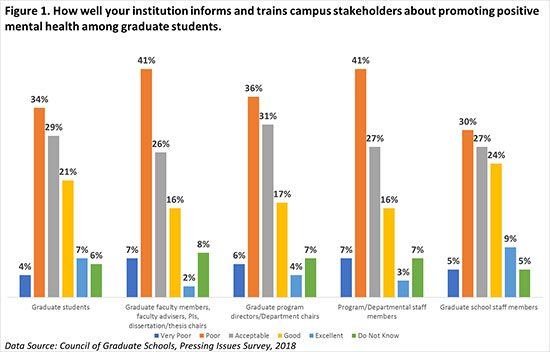
Promoting Mental Wellness
Of the graduate deans who responded to the survey, 33% reported that their institutions are doing a good or excellent job of training and informing graduate school staff members to promote positive mental health among graduate students. However, many graduate deans also felt that institutions are not doing enough to inform and train various graduate education stakeholder groups to promote positive mental health among graduate students. Notably, nearly half of responding graduate deans indicated that their institutions are doing a poor or very poor job of informing and training graduate faculty members, faculty advisers, PIs, and dissertation/thesis chairs. This is another area in which graduate schools have the potential to engage more graduate faculty members to promote positive mental health among graduate students: 47% of graduate deans also felt that when provided with adequate information and training, graduate faculty members should be best positioned to promote positive mental health among graduate students.
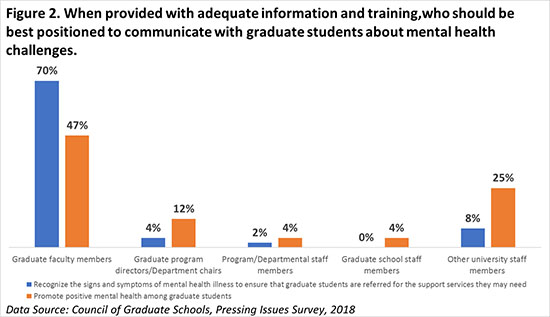
Moving the Conversation Forward
Graduate student mental wellness is a key area of priority for the graduate education community and CGS is committed to advancing the national conversation. At the 2017 CGS Annual Meeting, we held a concurrent session on Supporting Students With Mental Health Challenges, and at the upcoming CGS Summer Workshop in Chicago this July, Mona Shattell, chair and professor in the College of Nursing at Rush University, will give a plenary talk on supporting graduate student health and wellness. Also at the Summer Workshop, there will be a Dean’s Toolbox session about evidence-based strategies for supporting graduate student well-being and success, using an example from Texas A&M University. We encourage you to be there and to be a part of this important conversation.
CGS is also beginning to formulate a series of projects and initiatives that aim to facilitate culture change in academia and to destigmatize mental health support-seeking, while promoting mental wellness among master’s and doctoral students. As a first step toward this goal, we are preparing a white paper that addresses some of the foundational questions about trends in graduate student mental health challenges and ways for graduate schools and graduate school leaders to play more integral roles in promoting the mental wellness of master’s and doctoral students. As we draft this paper, which we will share with CGS members, we will explore examples of currently available resources and will reach out to member deans for insights. While we will conduct a scan of the landscape of both extant literature and institutional practices, it is also helpful to crowdsource some of the cutting-edge ideas among our member institutions. If you have any promising approaches, new initiatives, and insights in promoting mental wellness among master’s and doctoral students, we invite you to share them with us.
[1] Flaherty, C. (2018, March 6). Mental Health Crisis for Grad Students. Retrieved from https://www.insidehighered.com/news/2018/03/06/new-study-says-graduate-students-mental-health-crisis.
[2] Evans, TM., Bira, L., Gastelum, GB., Weiss, LT., and Vanderford, NL. (2018). Evidence for a Mental Health Crisis in Graduate Education. Nature Biotechnology, 36(3): 282-284, as well as Table 4 in Levecque, Anseel, De Beuckelaer (2017). Levecque, K., Anseel, F., De Beuckelaer, A., Van der Heyden, J., & Gisle, L. (2017). Work organization and mental health problems in PhD students. Research Policy, 46(4), 868–879. doi:10.1016/j.respol.2017.02.008. For reference, 1 in 5 American adults experience mental illness in any given year. (https://www.nimh.nih.gov/health/statistics/prevalence/any-mental-illness-ami-among-us-adults.shtml)
[3] Evans, TM., Bira, L., Gastelum, GB., Weiss, LT., and Vanderford, NL. (2018). Evidence for a Mental Health Crisis in Graduate Education. Nature Biotechnology, 36(3): 282-284.
[4] Eisenberg, D., Hunt, J., & Speer, N. (2013). Mental health in American colleges and universities. Journal of Nervous and Mental Disease, 201(1), 60–67. doi:10.1097/nmd.0b013e31827ab077; Hyun, J.K., Quinn, B.C., Madon, T. & Lustig, S. (2006). Graduate student mental health: Needs assessment and utilization of counseling services. Journal of College Student Development, 47(3): 247-266.
[5] Sowell, R., Allum, J., & Okahana, H. (2015). Doctoral Initiative on Minority Attrition & Completion. Washington, DC: Council of Graduate Schools.
[6] The 2018 CGS Pressing Issues Survey was sent to all U.S. and Canadian based CGS member institutions in February 2018, and asked graduate deans among other questions: How prevalent are mental health disorders among graduate students?; and Who is best positioned to recognize when a graduate student needs to be referred for mental health support services? In total, 204 or 42% responded to this survey.
[7] The 2017 CGS Pressing Issues Survey was sent to all U.S. and Canadian based CGS member institutions in February 2017. The survey asked a range of questions regarding priorities for graduate deans, graduate schools, and their home institutions for the upcoming twelve months, as well as observations of graduate application trends. In total, 205 or 42% responded to this survey.
The author thanks Julia Michaels, former CGS staff member, for her contribution to the literature review in this piece.
Though master’s programs and degree recipients have thrived, there has been scant research on the processes by which students gain admission into master’s programs. Recognizing this gap in our understanding of master’s admissions, in 2017 CGS, with support from Educational Testing Service (ETS), embarked on a project to better grasp how graduate programs evaluated applicants’ cognitive and noncognitive attributes and reviewed application materials. Improved understanding of master’s admissions would help graduate deans and their admissions teams put transparent processes in place to better identify promising candidates for admission and avoid unfair biases.
Project Goals
In December 2018 CGS released Master’s Admissions: Transparency, Guidance, and Training, which investigated master’s degree admissions practices. Information about master’s admissions was gathered through regional focus group discussions; from surveys completed by graduate program directors and graduate deans; and from discussions during a colloquium convened in September 2018 with graduate deans, employers from business and industry, and representatives from professional associations focusing on the admissions process. The data collected from these three sources were then distilled into Master’s Admissions: Transparency, Guidance, and Training, including its key findings, practice implications and directions for future research. This report is designed to enhance our understanding of current master’s admissions processes and chart a path to their future improvement.
Press Release
In Master’s Degree Programs, Admissions Processes Prioritize Retention (Dec. 4, 2018)
Additional Materials
- Master's Admissions: How Are Application Materials Used? (Research Brief)
- The Master’s Degree Admissions Study: Your Opportunity to Shape the Future of Master’s Education (January 2018,GradEdge)
- Complete Project Background
Contact
In collaboration with:
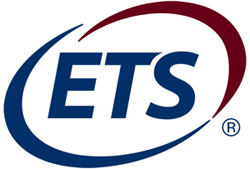
Supporting Diversity in Graduate Education
November 11-13, 2018
University of Johannesburg
The 2018 Summit theme, “Supporting Diversity in Graduate Education,” addresses the ways in which graduate education leaders across the world seek ways to identify, create, and disseminate curricula and strategies to ensure diversity in their programs and on their campuses. Developing a diverse graduate education community may mean different things in various parts of the world (race; ethnicity; gender; and socioeconomic, first-generation, or immigrant status). Through efforts to educate our communities and change social attitudes or focused outreach and support through workshops, recruitment fairs, and specialized program offerings, our shared goal is to foster learning environments that provide access and equity for all current and future graduate students.
The 2018 Global Summit on Graduate Education included leaders of graduate institutions from 17 countries across six continents. Attendees contemplated current efforts in the international graduate education community to promote diversity, including assessment in the admissions process, peer and faculty-mentoring, robust summer orientation programs, annual performance review system, etc. In addition, participants considered how individually and collectively we can improve upon these efforts for the benefit of students, universities, and broader communities.
Event Materials:
The 2018 Summit is generously sponsored by the Educational Testing Service (ETS).
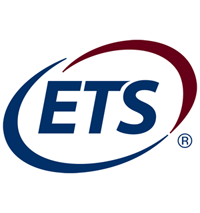
The U.S. graduate education community has a strong interest in defining the learning outcomes of doctoral programs. Having clear and explicit learning outcomes help students navigate important milestones, prepare students for a wide variety of career paths, and enable doctoral programs to measure their own success. Conversely, failure to clearly define the goals and outcomes of doctoral education puts the autonomy of programs at risk, as accrediting bodies and governing boards may define these outcomes for them.
To better understand the state of doctoral outcomes assessment in the U.S., the Council of Graduate Schools (CGS), with support from Lumina Foundation, conducted a year-long research project to explore national and global contexts for doctoral learning outcomes and evaluate the use of competency frameworks at the doctoral level. The results of this project inform the work of learning outcomes assessment for doctoral programs as well as next steps for graduate schools, faculty, and other stakeholders.
Graduate Education 2030: Imagining the Future
September 10-12, 2017
Alyeska Resort, Alaska
The 2017 Summit theme, “Graduate Education 2030: Imagining the Future,” revisits an earlier CGS project, Graduate Education 2020, which challenged leading scholars to consider technological, demographic, and global trends shaping graduate education around the world, and to use the best evidence available to predict what the future of graduate education might look like. Now that the year 2020 is within sight, we took the opportunity to reconsider the future these scholars imagined. Looking even farther ahead, to 2030, we invited international leaders in graduate education to describe the global forces transforming graduate education in their countries and regions: How does the nature of graduate education in 2030 differ from what is available in 2017?
The 2017 Global Summit on Graduate Education included leaders of graduate institutions from 16 countries across six continents. Attendees contemplated the potential future(s) of graduate education, and how individually and collectively we might help influence these forces for the benefit of students, universities, and broader communities.
Event Materials:
The 2017 Summit is generously sponsored by the Educational Testing Service (ETS).

**Photo Credit: Simon Evans
**Please note: CGS will only feature stories from CGS member institutions, but we welcome the use of #GradImpact by the larger graduate and professional education community to promote this important work.
Join CGS in Advocating for the Power of Graduate Education
Do you have a great story to share about the impact of master’s or doctoral education? Do you know a graduate student or alumnus whose work has the potential to cure a disease, alleviate poverty, or educate the public? The Council of Graduate Schools would like to hear from you.
CGS will draw from member examples to tell the larger story of graduate education through a variety of outlets: the CGS website, newsletters, social media, advocacy efforts, and media outreach. Our goal is to demonstrate that graduate education matters not only to degree holders, but also to the communities where they live and work.
To that end, we invite CGS member institutions to submit stories in one of three categories below.*
- Innovative Graduate Students
Tell us about a current master’s or doctoral student who is engaged in innovative, high-impact research and/or professional activity. Examples might include, but not be limited to, a doctoral student conducting cutting-edge research, a PMA or PSM student advancing the work of a company or non-profit organization, or a group of MBA students who have created a promising start-up company.
- Recent Alumni Making a Difference
Highlight a recent alum or alums (graduating between 2011 and 2016) who has used their graduate education to make a difference. Examples might be alums working to improve public health locally or globally, educating and inspiring the public in a museum or library, doing high-impact research at a university or national laboratory, or improving teaching and learning.
- Exceptional Employers
Tell us about an employer of graduate students or alumni who is making a difference in the business, non-profit or government sectors. Examples might include employers working to bring medications to market more quickly and safely, to inform public policies, or to bring the arts to a public school system.
Criteria for Selection of Stories:
A committee will evaluate our selection of stories using the following principles:
- Impact on the Public Good: We are seeking examples that positively impact (or have a high potential to impact) the lives of others through education, health, safety and security, the humanities, and economic development. Examples from any field of study are welcome.
- Diversity: CGS will seek to present a diverse range of member institutions, fields of study, and degree types. We also seek a diverse representation of participants in graduate education, particularly in terms of race/ethnicity, gender, and age.
- Share-ability: We will give priority to examples that are already available publicly on at least one website. This will allow us to share them more broadly through our own website and social media outlets. For this reason, we require submissions to include a link to a URL address.
Stories deemed to be particularly effective at demonstrating the impact of graduate education on the public good will be highlighted on the home page of the CGS website or in GradEdge.
*There is no limit on the number of stories your institution may submit. However, please be aware that a large number of submissions will not result in greater representation of your institution in CGS outlets. We will work to ensure that representation is evenly distributed among member institutions that choose to submit examples.
Instructions for Submitting Stories:
Please complete this electronic web form.
Contact:
In 2016, CGS received a grant from the National Endowment for the Humanities (NEH) to establish the Next Generation Humanities PhD Consortium (Next Gen Consortium), a collaborative learning community for the 28 NEH Next Generation PhD grant awardees. These universities, all of which are CGS member institutions, seek to strengthen the career preparation of PhD students in the humanities. CGS provided intellectual leadership to this group and guided their mission to transform the culture of graduate education.
New resource: Inclusive language options for talking about humanities PhD careers
Other results from the project include:
Written to help guide applicants to NEH Next Generation Humanities PhD grants, as well as any campus team interested in pursuing the goals of the Next Gen program. Part I, Lessons Learned, summarizes the common features of Next Gen projects and outlines some of the challenges and promising solutions employed by grantee universities in pursuit of the larger goals of the grant program. Part II, Emerging Strategies, offers suggestions for additional considerations that might be included in the design of Next Gen programs. Please note that Promising Practices does not constitute evaluation criteria for the selection of 2018 grantees; rather, this document is intended to help institutions understand what practices have been most successful for past grantees, and identify ideas and approaches that are appropriate to their campuses.
Provides a history of prior work in humanities PhD professional development, and is intended to serve as an introduction to the field for anyone interested in professional development for humanities PhDs.
Contact
This CGS report reviews what is currently known about the career pathways of doctoral degree holders, current gaps in our understanding, and areas that call for greater clarification. It outlines findings from a year-long feasibility study supported by The Andrew W. Mellon Foundation and the Alfred P. Sloan Foundation. This work represents the first step toward closing knowledge gaps about the long-term career paths taken by PhDs in the US and Canada across all broad fields.
The Council of Graduate Schools conducted a pilot project in 2014-16 to study the professional development needs of graduate students in Science, Technology, Engineering and Mathematics (STEM) fields and the programs and resources in place to meet those needs.
Project Overview
Enhanced professional development of STEM graduate students has emerged in recent years as a high priority as evidenced by calls from students, employers, funding agencies, and graduate deans. The CGS pilot study gathered perspectives from stakeholders representing each of these groups to answer four key questions:
- Beyond research skills, what other professional skills are particularly important for STEM graduates?
- What STEM workforce skills needs are not currently being met by graduate programs?
- How can resources and investments be most effectively mobilized to meet that demand through enhanced professional development?, and
- What structures and learning environments are most effective in responding to the career tracks for PhD and master’s students?
The project entailed a survey of CGS members, interviews with employers from across the STEM workforce including industry and government, a workshop convening a wide array of stakeholders, and an online searchable database of existing professional development programs for STEM graduate students.
Results
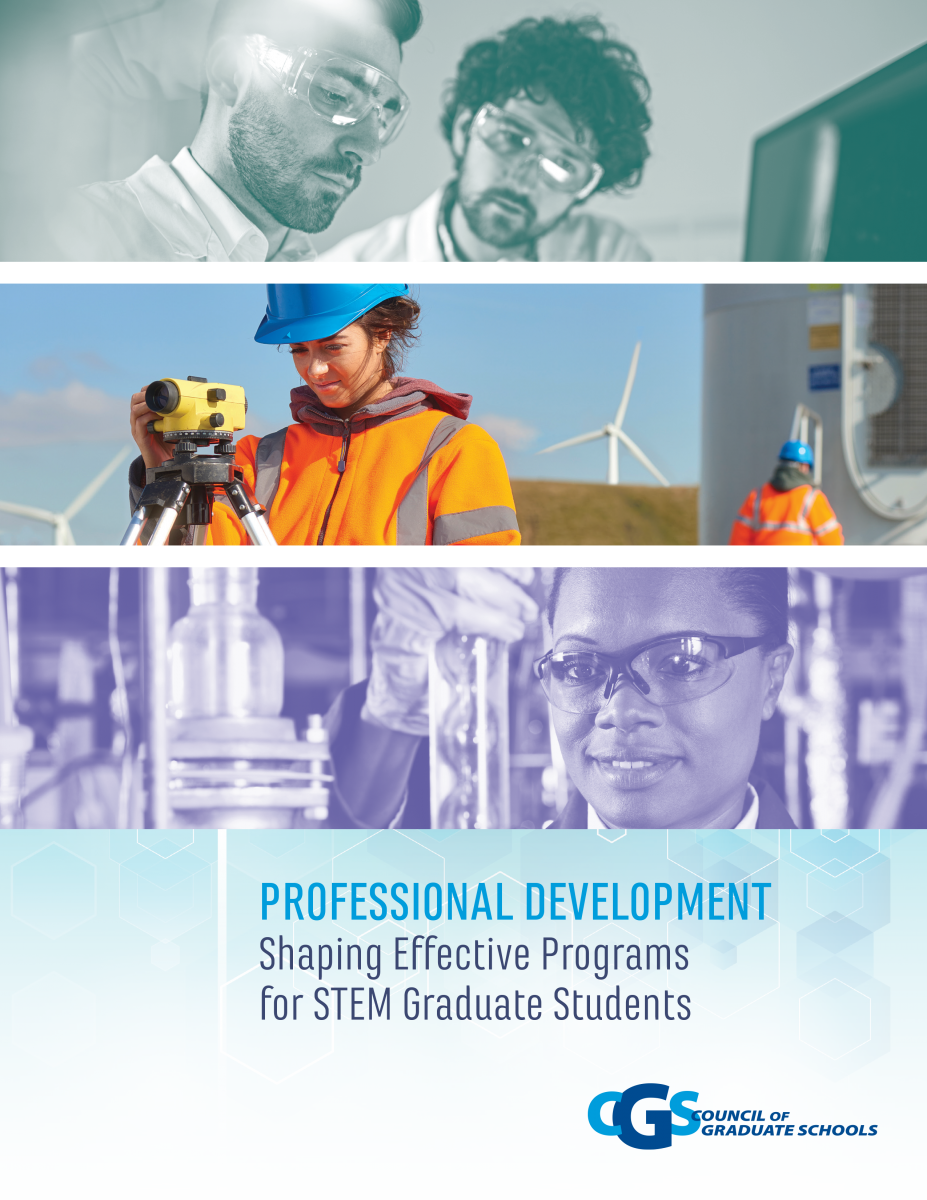 Promising practices, common challenges, recommendations, and possible next steps toward coordinated improvements to the professional development of STEM graduate students, including PhDs, master’s degree holders, and postdoctorates are available in the report: Professional Development: Shaping Effective Programs for STEM Graduate Students. This report also includes discussion of useful tools and resources, as well as of issues that commonly arise in university discussion around professional development. Hard copies of this report are available to CGS members and non-members for purchase here.
Promising practices, common challenges, recommendations, and possible next steps toward coordinated improvements to the professional development of STEM graduate students, including PhDs, master’s degree holders, and postdoctorates are available in the report: Professional Development: Shaping Effective Programs for STEM Graduate Students. This report also includes discussion of useful tools and resources, as well as of issues that commonly arise in university discussion around professional development. Hard copies of this report are available to CGS members and non-members for purchase here.
Professional Development Programs: An Online Compendium
CGS has compiled an online searchable database of existing professional development programs for STEM graduate students that draws from survey results, web research, and feedback from institutions. The primary purpose of this database is to spotlight promising programs, enhance understanding of the skills and structure of these programs, and to provide an opportunity for graduate schools to connect to others as they seek to develop robust professional development programs for graduate students. While all are welcome to explore this database, the resource was designed especially to inform individuals in university leadership roles who seek to enhance professional development for STEM graduate students and postdocs at U.S. universities.
Workshop
A one-day, workshop-style meeting to identify needs and opportunities for improving U.S. graduate education with a focus on enhanced professional development for STEM PhD’s and master’s students took place in Washington, D.C., on November 8-9, 2015. The meeting convened key employers from industry, government, and non-profit sectors; graduate deans and university researchers on graduate education and the STEM workforce; and representatives from federal agencies that fund STEM graduate students.
Workshop Agenda and Presentations
Contact
Supported by a grant from the National Science Foundation (NSF #1413827)
Any opinions, findings, and conclusions or recommendations expressed in this project do not necessarily reflect the views of the National Science Foundation.
The ability to resolve ethical issues that arise in international research is critical to the success of U.S.-trained scientists and engineers. It is also essential to ensuring the integrity of U.S. research with international partners. With funding from the National Science Foundation (NSF #1135345), CGS completed a three-year, collaborative project to develop accessible and replicable models for preparing STEM researchers to navigate ethical challenges in international research collaborations.
Project Goals
- Identify and test learning outcomes for research ethics education in international collaborations
- Document approaches to using those outcomes to enhance the preparation of STEM graduate students
- Develop case studies based on successful programs and an online repository of graduate learning outcomes
Project Outcomes
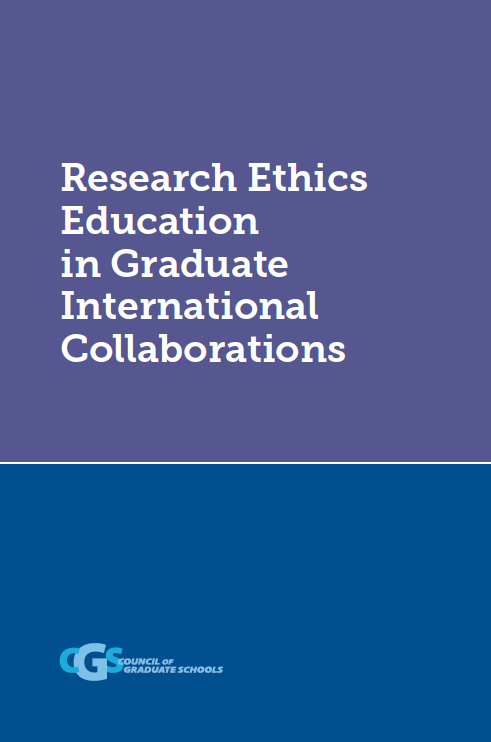
Research Ethics Education in Graduate International Collaborations
Online Repository: Learning Outcomes & Assessment Tools
Research Partners
Through a competitive process, the following institutions were selected to participate in the project as funded research partners:
An additional six universities participated as affiliate partners:
- Drexel University
- Indiana University
- Loyola University Chicago
- Mississippi State University
- North Carolina A&T University
- Purdue University
Additional Resources
More information about the project goals and background can be found in a CGS Framework Paper written to guide the development of proposals.
Contact
Supported by a grant from the National Science Foundation (NSF #1135345)





